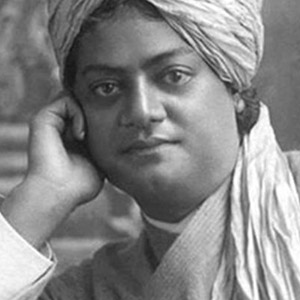
Vivekananda (1863 – 1902) was an Indian Hindu monk, a chief disciple of the 19th-century Indian mystic Ramakrishna. He was a key figure in the introduction of the Indian philosophies of Vedanta and Yoga to the Western world and is credited with raising interfaith awareness, bringing Hinduism to the status of a major world religion during the late 19th century. He was a major force in the revival of Hinduism in India. He first introduced Hinduism at the Parliament of the World’s Religions in Chicago in 1893, and over his lifetime conducted hundreds of public and private lectures and classes, disseminating tenets of Hindu philosophy in the United States, England and Europe.

Quotes by Vivekananda…
Every reaction in the form of hatred or evil is so much loss to the mind, and every evil thought or deed or hatred, or any thought of reaction, if it is controlled, will be laid in our favor. It is not that we lose by thus restraining ourselves; we are gaining infinitely more that we suspect… it is so much good energy stored up in our favor; that piece of energy will be converted into higher powers.
While we are aware of thirsting after knowledge, we begin to seek here and there, wherever we think we can get some truth, and, failing to find it we become dissatisfied and seek in a fresh direction. All search is vain, until we begin to perceive that knowledge is within ourselves… that we must help ourselves… Then we may know that the sun is rising, that the morning is breaking for us, and, taking courage, we must persevere until the goal is reached.
It is the greatest manifestation of power to be calm. It is easy to be active. Let the reins go, and the horses will drag you down. Any one can do that, but he who can stop the plunging horses is the strong man. Which requires the greater strength, letting go, or restraining? The calm man is not the man who is dull… Activity is the manifestation of the lower strength, calmness of the superior strength.
It is true that all knowledge is within ourselves, but this has to be called forth by another knowledge. Although the capacity to know is inside us, it must be called out.
It is only when everything, even love, fails, that, with a flash, man finds out how vain, how dream-like is this world. Then he catches a glimpse… of the beyond. It is only by giving up this world that the other comes; never through holding onto this one.
The cause of misery is the clash between the different forces of nature, one dragging one way, and another dragging another, rendering permanent happiness impossible.
The first lesson, then, is to sit for some time and let the mind run on. The mind is bubbling up all the time. It is like that monkey jumping about. Let the monkey jump as much as he can; you simply watch and wait. Knowledge is power says the proverb, and that is true. Until you know what the mind is doing you cannot control it. Give it the full length of the reins; many most hideous thoughts may come into it; you will be astonished that it was possible for you to think such thoughts. But you will find that each day the mind’s vagaries are becoming less and less violent, that each day it is becoming calmer… until at last it will be under perfect control, but we must patiently practise every day.
The pure man… has the power of bringing it (higher truth) into a certain state of vibration, which can be conveyed to others, arousing in them a similar vibration. You see that in everyday actions. I am talking to you. What am I trying to do? I am, so to say, bringing my mind to a certain state of vibration, and the more I succeed in bringing it to that state, the more you will be affected by what I say. All of you know that the day I am more enthusiastic the more you enjoy the lecture.
A few golden apples are rolled, and the world scrambles after them. You were never bound by laws, Nature never had a bond for you… We have placed ourselves in this net, and will have to get out… Never forget this is only a momentary state, and that we have to pass through it.
There are stages through which we have to pass, and all those who persevere will succeed. Give up all argumentation and other distractions. Is there anything in this dry intellectual jargon? It only throws the mind off its balance and disturbs it. These things have to be realized. Will talking do that? So give up all vain talk. Read only those books which have been written by persons who have had realizations.

